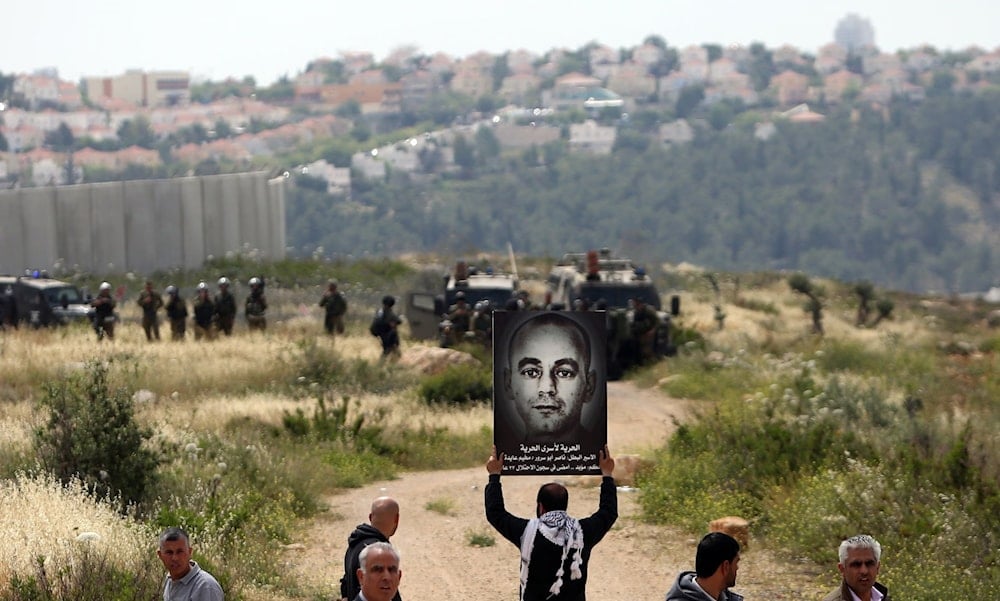Israeli prisons became like ‘another front’: Freed Palestinian author
Palestinian writer Nasser Abu Srour says torture in Israeli prisons worsened amid the war on Gaza, describing brutal conditions before his release after 32 years.
-

A placard of Nasser Abu Srour is held aloft during a 2015 demonstration marking Palestinian Prisoner Day in the West Bank town of Bilin, near Ramallah (AFP/Getty Images)
A prominent Palestinian writer freed after more than 32 years in Israeli prisons has said that torture and abuse escalated sharply during the war on Gaza, with "Israel" turning its prisons into “another front”.
Nasser Abu Srour, 56, whose acclaimed prison memoir The Tale of a Wall: Reflections on Hope and Freedom has been translated into seven languages, was among more than 150 Palestinians serving life sentences who were released as part of the US-brokered Gaza ceasefire. Many freed captives were immediately exiled to Egypt, where most remain in limbo.
Abu Srour recounted a drastic increase in beatings, deprivation of food, and exposure to cold after the war on Gaza erupted in October 2023.
“The prison guards’ uniform changed, with a tag on the chest written on it the word ‘fighters’, or ‘warriors’, and they started acting like they were in a war and this was another front, and they started beating, torturing, killing like warriors,” he said.
A UN commission documented 75 deaths of Palestinians in Israeli custody between October 7, 2023, and August 31, 2025, though the Israeli prison service denies the use of torture.
Read more: Hamas demands int'l probe into mutilated bodies returned by 'Israel'
From decades of confinement to sudden exile
Speaking from Egypt, Abu Srour described the shock of being moved “from the brutality of prison to a five-star hotel in Cairo.” Arrested during the first Intifada, he was sentenced to life in 1993 on the basis of a confession extracted under torture. Over three decades, he earned university degrees and began writing poetry and political essays from behind bars.
When officials came with the list of captives to be freed, Abu Srour initially ignored them.
“They were calling out cell numbers and I was sitting on my bed in room No. 6, feeling like I was not part of it,” he said. “But then they came to my cell and said: ‘Nasser, prepare yourself.’ God’s grace finally reached me.”
Read more: Palestinian Resistance remains steadfast, victorious Larijani says
Brutal conditions behind bars
Abu Srour detailed how treatment worsened dramatically.
“Any place where there are no cameras was a place for brutality,” he said. “They would tie our hands behind our heads and throw us on the floor, and then they would start trampling on us with their feet.”
Under the oversight of "Israel's" Police Minister Itamar Ben-Gvir, who has boasted that prisons are no longer “holiday camps", Abu Srour said that all books and writing materials were seized.
“All cultural life in the prison ended in the last two years, so there was only biological life. Everyone tried to survive in their own way. And we were always hungry,” he said.
Daily food rations were reduced to bare survival; he lost 12 kilograms, and prisoners had only one thin set of clothes for winter.
“Whenever someone was leaving prison, everyone would try to become their friends so they would get their T-shirt or underwear, or anything,” he added.
Read more: Gaza’s starvation crisis: Why food aid alone can’t stop the deaths
Final beatings before release
In the 24 hours before the detainees’ release, Abu Srour said they were subjected to a final wave of severe beatings. During their 48-hour transfer across "Israel" to Egypt via Rafah, they were forbidden from opening the bus curtains. Only after entering Egypt did he see the open sky for the first time in decades.
Upon arrival, the freed captives were lodged in a luxury Cairo hotel under Egyptian supervision.
“I’d never been to a hotel before. I did everything for the first time like a child, to get in and out of a lift, to learn about room service, how to perceive or use a shower,” he said.
Read more: 'Israel' under fire over bill to execute Palestinian detainees
Life after prison: Uncertain freedom
Abu Srour reunited with family members he had not seen in 33 years. Yet, freedom, he said, came with disorientation and emotional strain.
“We saw the buffet, and we saw all that food. So the guys all put 2kg of food on their plates. It was a surreal scene. We were embarrassed. We did not know what to do with our knife and fork,” he said.
Following reports in British media labeling the hotel “Hotel Hamas", the group was abruptly moved to another facility in the desert, an hour from Cairo, a reminder that their freedom was still conditional.
Now, Abu Srour is considering offers from several countries to resettle, prioritizing proximity to his family and the ability to continue his writing.
“I don’t want a comfortable country,” he said. “I don’t want a country without questions or a country without a cause.”

 5 Min Read
5 Min Read









